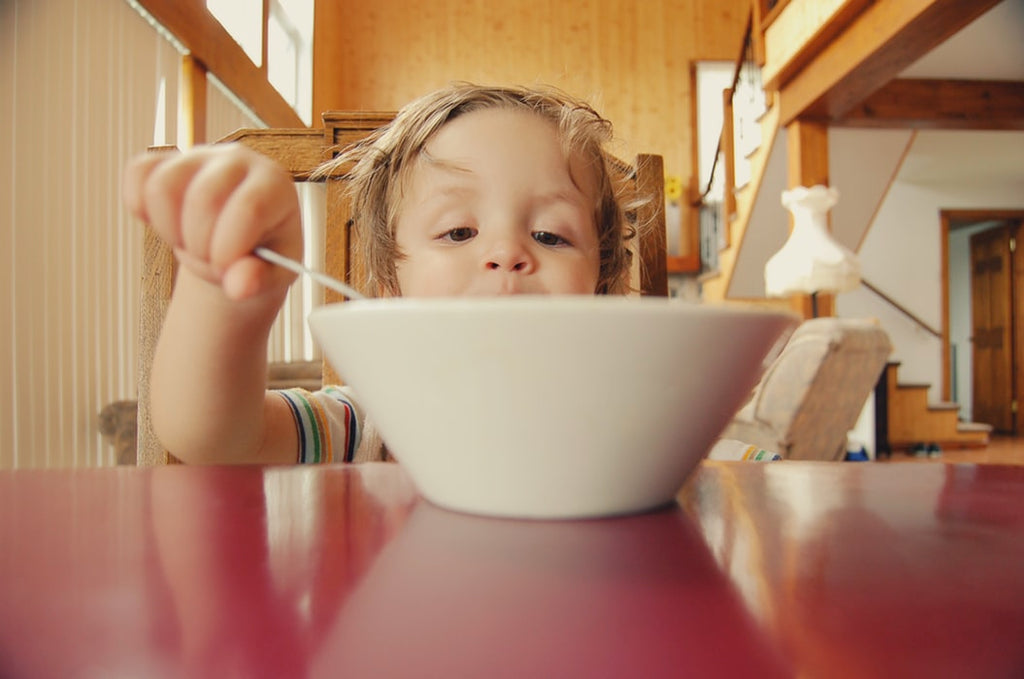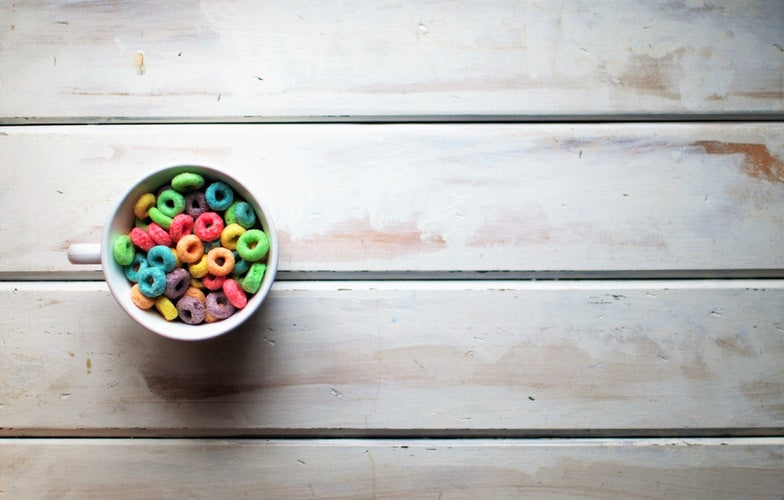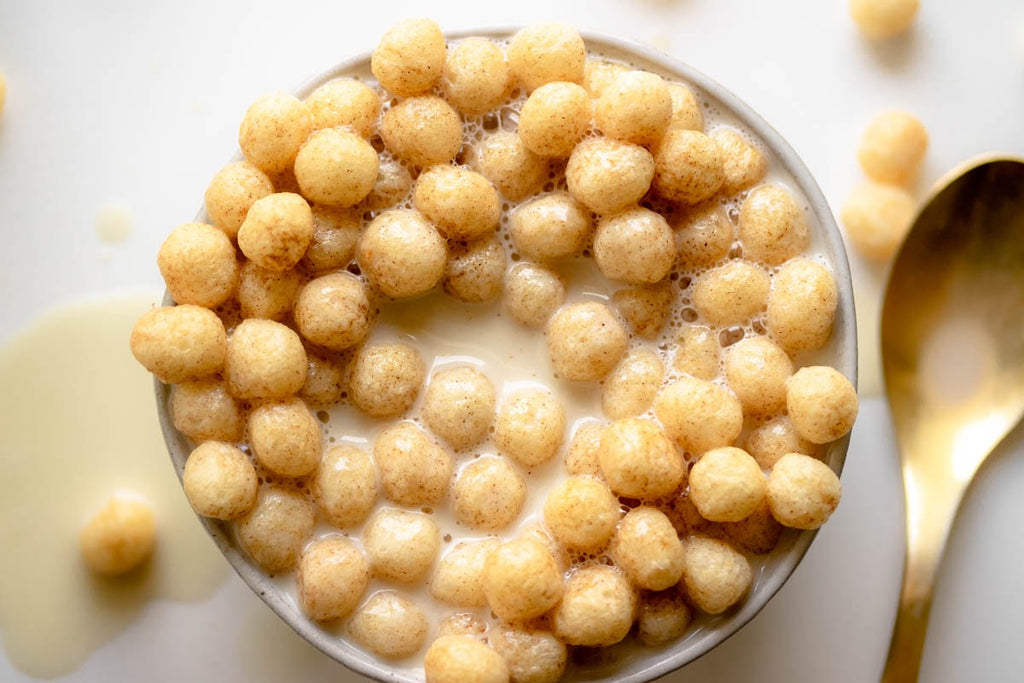
Between doing the laundry, hitting the gym, and cleaning up the inevitable mess your child seems to produce by simply looking at a room, the last thing you need to worry about is whether or not your breakfast cereal is as healthy as the label says it is. You want to know if the box says it's a healthy cereal for kids, that's what it is — healthy.
The non-profit Environmental Working Group has found that most cereals contain more added sugar than recommended by experts, rendering them far from a healthy breakfast.
However, many cereal manufacturers seem to have been making improvements to their products. You can see them in the cereal aisle of your local grocery store: Large boxes of brightly-colored breakfast cereal with all sorts of health claims.
Whole grain? Check.
Low in sugar content? Check.
The word "healthy" emblazoned on the box? Check.
What Does Healthy Cereal for Kids Look Like?
Between all the clever marketing ploys, promising labels, and your kid’s finicky eating habits, it can be hard to choose the best cereal for your young one. So, what makes cereal healthy for kids? Below are a few things to consider on your next grocery run.
Sugar
The American Heart Association (AHA) advises that kids between the ages of 2-18 should have less than 25 grams of added sugars per day. Eating too much sugar over an extended period can lead to type 2 diabetes, heart disease, and other serious health problems.
Protein
Protein helps your kid’s body form muscle, produce hormones, strengthen skin and bones, and transport nutrients. It also helps them to feel full and stay full.
Children ages 4-9 need 19 grams of protein each day while those between ages 9 and 13 need 34 grams. The recommended protein for teens between ages 14-18 varies by gender: Boys need 52 grams, and girls need 46 grams.
Fiber
A high-fiber diet helps prevent or alleviate constipation, increases feelings of fullness, and can help prevent heart disease and diabetes. An easy way to calculate how much fiber your child needs is to add 5-10 to your child's age.
So, a five-year-old needs 10-15 grams of fiber every day while a 10-year-old needs 15-20 grams per day.
Think These 8 Brands Are Healthy Cereal for Kids? Think Again

It's time for a heart to heart, from one cereal lover to another. Many of today’s so-called healthy cereals for kids are not as nutritious as they claim to be — especially when you look closely at their nutritional value. Before your next trip to the grocery store, here are eight cereal brands you may want to leave on the shelf.
1. General Mills Cheerios
They come in a variety of different colors and flavors, but one thing is certain: Cheerios is widely considered a healthy choice. General Mills tells us it's a cereal that reduces cholesterol, and this popular cereal has some things going for it. It’s gluten-free, has vitamins A, C, and D, and the original version has just 100 calories per one-cup serving.
But here's the problem: The nutritional label of the original version tells us it has only 3 grams of protein and 20 grams of carbs per cup serving. Not exactly a high-protein cereal to ensure your kid stays full and avoids a mid-afternoon daze.
2. Sakara Classic Superfood Granola With Almonds and Goji Berries
Packed with rolled oats and nuts, you'd think Sakara Classic Superfood Granola would be a healthy breakfast choice — until you look at the nutrition facts.
Sure, Sakara's granola may have high-protein almonds and goji berries to increase the fiber content, but it also has 9 grams of sugar and 250 calories per half-cup serving. And let's be honest — who sticks to the recommended serving size when eating cereal, especially when it's only half a cup?
As such, this granola might not be ideal as the first meal of the day, especially when you consider the potential sugar content in your kid’s lunch, dinner, or any snacks in between.
If your child loves granola, there’s no need to give it up completely. Instead, use it sparingly as a topping for Greek yogurt, homemade chia pudding, or mixed with fresh fruit.
3. Barbara's Berry Burst Protein Puffins Cereal
Barbara's Berry Burst Protein Puffins Cereal has all the makings of healthy cereal for kids. It’s gluten-free, non-GMO verified, and free from preservatives, artificial colors, and flavors.
With 6 grams of protein and 3 grams of fiber per one-cup serving, this cereal could potentially keep your kids feeling full until lunchtime.
But things get less rosy when you read the rest of the nutritional label, which lists 9 grams of added sugar per serving, and 30 grams of carbs.
The Original Puffins don't fare much better, with 5 grams of added sugar, 23 grams of carbs, and just 2 grams of protein.
4. General Mills Kix
The Kix slogan may be "Kid-tested, Parent-approved," but this breakfast cereal might not pass muster in your household. While we do approve of its low sugar content (just 3 grams per 1.3 cup serving), Kix only offers 2 grams of protein. Not exactly the best way to keep hunger at bay for the kids.
It's also made from whole-grain corn. While that may sound wholesome and healthy, corn is a cereal crop often found to contain the herbicide glyphosate. So, unless weedkiller for breakfast sounds appealing to you, it's probably not the healthiest option for your kids.
5. Kashi by Kids Honey Cinnamon Cereal
If your kid's a fan of cinnamon cereal, this sounds like the go-to option for them. “Made for kids by kids” in fun shapes of cinnamon swirls and honey-filled pillows, you might consider stealing a few spoonfuls for yourself.
It's non-GMO, organic, vegan, includes ingredients such as brown rice flour and red lentil flour, and aims to stay crunchy in milk.
But then you see cane sugar listed as the second ingredient and 9 grams of sugar per serving, and you realize it's probably better to put that spoon away.
6. Nature's Path Flax Plus Multibran Flakes
If you're looking for an alternative to corn flakes or bran flakes, this organic, non-GMO version from Nature’s Path seems like a good idea. With omega-3-rich flax seeds, whole-wheat ingredients, and just 4 grams of sugar per serving, these flakes look like a wise choice as far as low-sugar cereals go.
It's also a relatively high-fiber cereal, with 5 grams in each bowl (20% of your daily intake). However, with a paltry 4 grams of protein, it may not keep your kid feeling full and energized as the day wears on.
7. Cascadian Farms Hearty Morning
You'd certainly be giving your kid a hearty morning with this cereal: 8 grams of fiber per serving, to be precise. Made with non-GMO, organic whole-grain oats, and crisp rice, Cascadian Farms Hearty Morning looks like a healthy choice.
But with cane sugar listed as the third ingredient (resulting in 10 grams of added sugar), this isn’t an ideal way to fuel your kid through the day.
8. Kellogg's Frosted Mini-Wheats
OK, you might not need us to tell you that Frosted Mini-Wheats aren’t a healthy cereal for kids. But if you believe the brand’s marketing claims, all you need is “1 bowl and you’re good till lunch.”
Granted, a serving (about 25 biscuits) of this popular cereal offers 100% of the daily recommended value of iron and folate, as well as 5 grams of protein and 6 grams of fiber. But this cereal’s high sugar content (12 grams, to be precise) hardly makes it a healthy start to your kid’s day.
The Best Healthy Cereal for Kids

Cereal is only as good as its ingredients. Along with being high in protein and fiber, it should be low in sugar and free from any potentially harmful additives, chemicals, and artificial ingredients.
We may not sound humble here, but we're pretty confident saying that the Cereal School qualifies as a healthy cereal for kids. And you don't have to just take our word for it. The facts speak for themselves.
Our cereal is low-carb, grain-free, and gluten-free, with all-natural ingredients that don’t have any artificial colors or flavors. Each serving contains a whopping 16 grams of protein per serving and using monk fruit as a natural sweetener also means there are zero grams of sugar.
Plus, Cereal School comes in a variety of kid-loving flavors, including Cocoa, Cinnamon Bun, Fruity, Peanut Butter, and Berries. All are conveniently packed in a pre-portioned packet, so your kid can enjoy it first thing in the morning or take it on the go as a nutritious snack. So, what are you waiting for? Check out what others are saying with these customer reviews.



